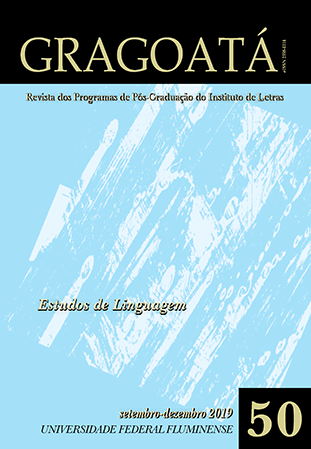The renewal of the literary communication contract of "Conto de Escola": characteristics and implications
DOI:
https://doi.org/10.22409/gragoata.v24i50.34165Palabras clave:
Conto de Escola, renewed literary communication contract, verbal-visual hybrid text, editorial paratexts, child reader.Resumen
This article aims at analyzing how the redefinition of the subjects of the narrative staging, channel, and semiological codes determines the renewal of the literary contract of the short story "Conto de Escola" in its 2002 reprint by Cosac Naify publishers, taking into account the Semiolinguistic Discourse Analysis Theory and, in a subsidiary way, the studies of editorial paratexts and visual forms. The Machadian short story, originally published in 1884, was reprinted, in a book of the same name, as a verbal-visual hybrid text by the publisher's initiative and the work of Nelson Cruz, who authored the illustrations and the editorial project. The most relevant implications of this process of renewal of the literary contract are the amplification of the effects of meaning and, more particularly, the intensification of the pathemic effects as a result of the word-image interaction, which is inserted in a material and discursive mise-en-scène, organized by the editorial paratexts. This results in inscribing children as target readers, unlike previous contracts, which now allows for the book under analysis to be identified as potential literature for children.
---
Original in English.
Descargas
Descargas
Publicado
Número
Sección
Licencia
AUTORIZAÇÃO
Autores que publicam em Gragoatá concordam com os seguintes termos:
Os autores mantêm os direitos e cedem à revista o direito à primeira publicação, simultaneamente submetido a uma licença Creative Commons Atribuição 4.0 Internacional (CC BY 4.0), que permite o compartilhamento por terceiros com a devida menção ao autor e à primeira publicação pela Gragoatá.
Os autores podem entrar em acordos contratuais adicionais e separados para a distribuição não exclusiva da versão publicada da obra (por exemplo, postá-la em um repositório institucional ou publicá-la em um livro), com o reconhecimento de sua publicação inicial na Gragoatá.
A Gragoatá utiliza uma Licença Creative Commons - Atribuição CC BY 4.0 Internacional.











